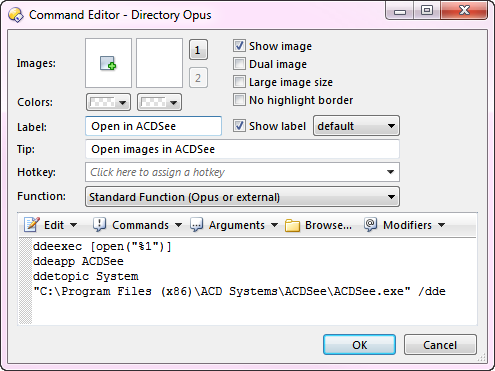DDE Functions
DDE (Dynamic Data Exchange) is an antiquated system for passing
data between different programs on a Windows system. These days, it's not used
much - although perhaps surprisingly, Explorer Replacement mode is actually
implemented via DDE (for historical reasons more than anything).
Nonetheless, you may have an old program that supports a DDE interface, and
should the need arise, it's possible to configure a button or hotkey to send
what's called a DDE message to another application.

Above is an example command that establishes a DDE conversation and sends a
command to another program. As this technique requires multiple command lines,
you must create the command in the Advanced Command Editor. The four lines
in the above function are:
- ddeexec: The ddeexec instruction
specifies the "message" that is to be sent to the other program. This will be
defined by that program - the above screenshot is only an example. The
%1 external control code is used to
include the name of the selected file in the message.
- ddeapp: The ddeapp instruction specifies
the "application name" - this is the name that the other program looks for
when DDE messages are sent.
- ddetopic: The ddetopic instruction
specifies the "message topic" - again, this is application specific.
- The final line provides the actual command line used to launch the other
program. This will normally involve passing some sort of command line flag
telling the other program you want it to run in DDE mode - as in the above
screenshot, with the /dde parameter. Again though, this is
entirely dependent on the application in question.

